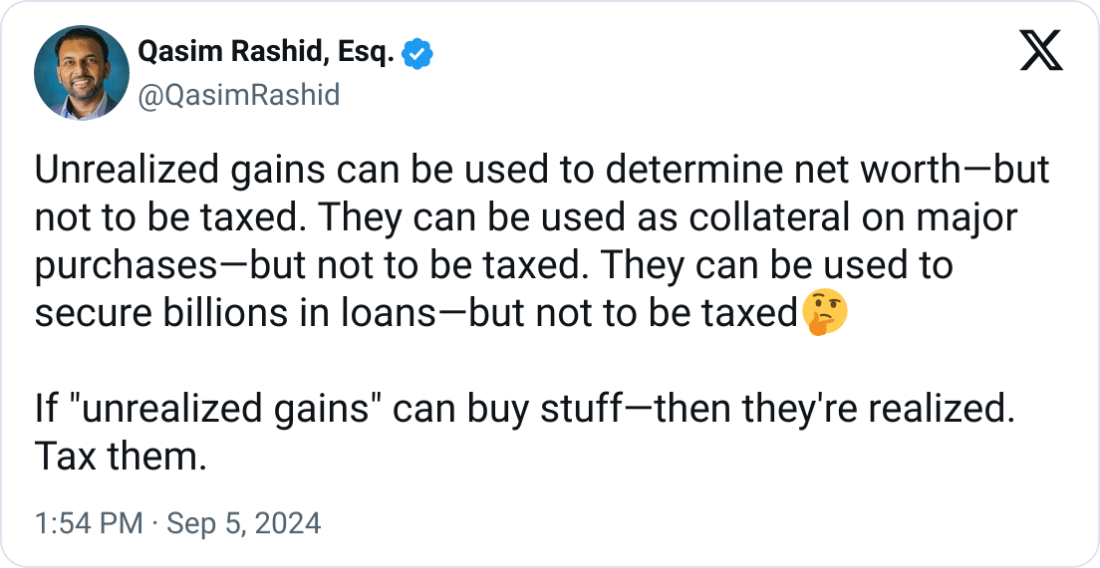this post was submitted on 19 Sep 2024
1600 points (96.8% liked)
Microblog Memes
6018 readers
1947 users here now
A place to share screenshots of Microblog posts, whether from Mastodon, tumblr, ~~Twitter~~ X, KBin, Threads or elsewhere.
Created as an evolution of White People Twitter and other tweet-capture subreddits.
Rules:
- Please put at least one word relevant to the post in the post title.
- Be nice.
- No advertising, brand promotion or guerilla marketing.
- Posters are encouraged to link to the toot or tweet etc in the description of posts.
Related communities:
founded 1 year ago
MODERATORS
you are viewing a single comment's thread
view the rest of the comments
view the rest of the comments

What is your "preferred solution"?
The idea that businesses shouldn't be bought or sold is not a solution at all.
A moratorium on IPOs, and purchasing of businesses in any form. Then, all the monopolies like Google, apple, meta, etc need to be broken up. And then, these companies need to be switched to being employee owned where possible.
Slowly over time all businesses will die off, but the ones controlled with stocks will never be replaced. After a few decades of this, the only businesses that will be left will be ones not controlled through stocks or personal ownership.
The economy needs to serve the needs of the people, not the rich.
Sure it is. The current system has led to a shell game designed to steal the worker's wealth and funnel it to the rich. It's led to extreme wealth inequality. It's led to situations in which it is extremely difficult to tax the rich. It's led to politicians who personally enrich themselves because they constantly have insider knowledge. It's led to business that hoard extreme profits, just to hand them over to the already rich shareholders.
We don't need businesses to be able to be bought and sold. However we do need strength to be given to labor.
You don't seem to understand that the overwhelming majority of businesses are sole proprietorships.
You don't seem to understand that the second most common type of business is a simple partnership.
You don't seem to understand that what you are describing would require a prohibition on converting a sole proprietorship into a partnership, and vice versa. Once you organize a small, home-based business, you can't later take on a partner, to share risks and rewards.
Worker-owned businesses are now prohibited, because workers can't transfer their ownership to other workers when they join or leave. Co-ops are prohibited, same reason.
No, I'm afraid that you haven't put much actual thought into this idea. In your zeal to tax the richest among us, you've just made it so that they are the only ones capable of starting a business with any chance of success.
No, you've misunderstood. I'm aware of how prevalent those kinds of businesses are, but the goal of this conversation isn't to provide a full legalese explanation or complete set of policy. The purpose is to talk about and have a sense of what the fuck we should be doing. Of course there is going to need to be a different set of rules for businesses with few employees, I never said otherwise. Of course there is going to need to be exceptions, I never said otherwise.
But you've jumped to conclusions instead of asking and having an actual conversation about what this would look like.
Worse, I'd argue that sole partnerships, simple partnership, etc already are employee owned. So even if I was saying that the previous stated limits should be applied with no exceptions or other considerations, it largely wouldn't have anything to do with those kinds of businesses.
Stop gaslighting.
You replied to a comment where I had presented the case of a small business, valued at $150,000 to $250,000. I presented that hypothetical small business as an example of unrealized gains.
When I asked your preference, you stated:
After responding to an example of a small, $250,000 business, you used unequivocal language about businesses to demonstrate your point. You certainly did "say otherwise".
My grandmother could make that "jump" in her wheelchair, and she died three years ago.
Your plan is not particularly well formed and/or you are communicating it rather poorly. Slow down, take your time, present it reasonably, and be prepared for reasonable criticism.